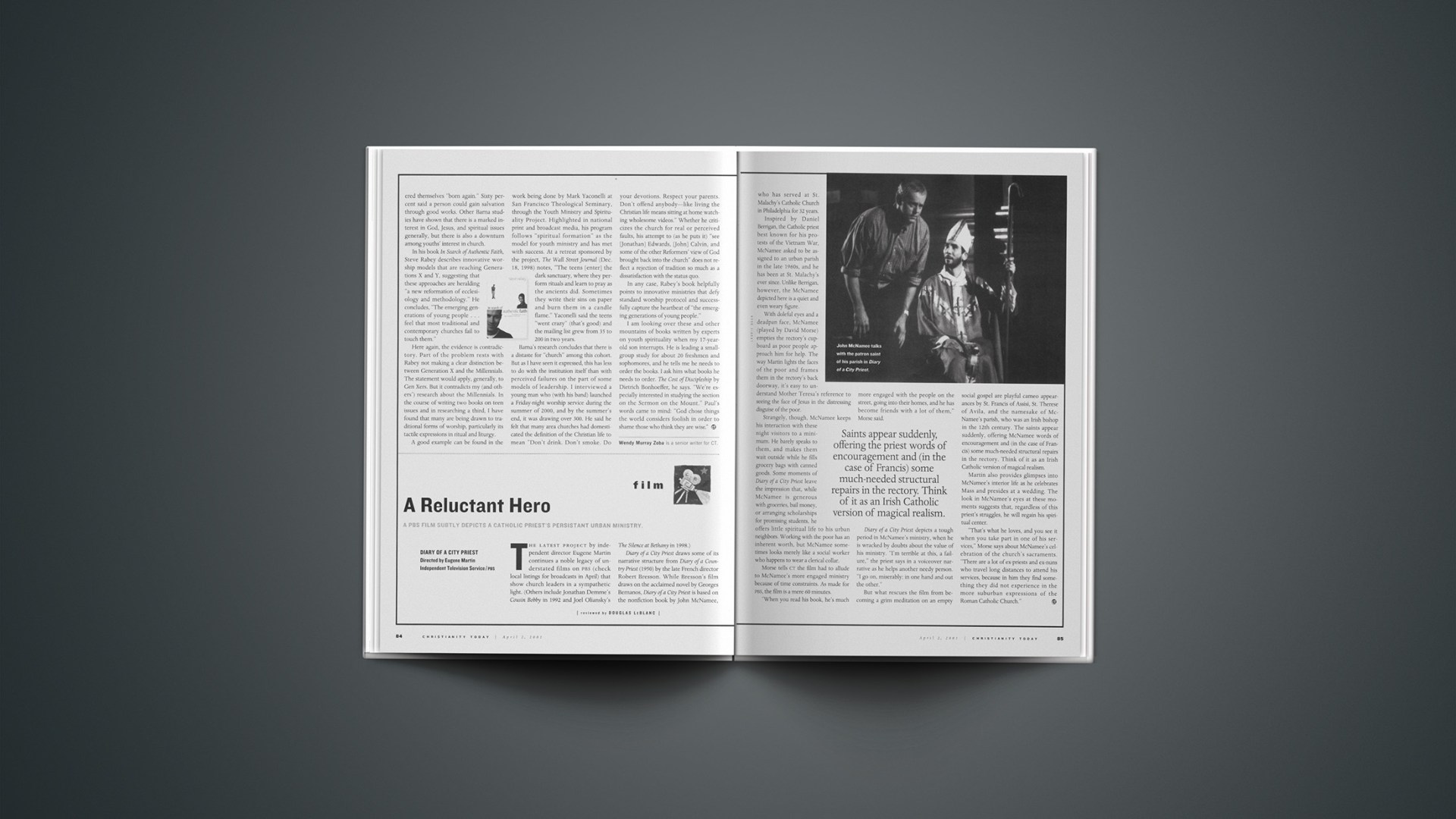Diary of a City Priest
Directed by Eugene Martin
Independent Television Service/PBS
The latest project by independent director Eugene Martin continues a noble legacy of understated films on PBS (check local listings for broadcasts in April) that show church leaders in a sympathetic light. (Others include Jonathan Demme’s Cousin Bobby in 1992 and Joel Oliansky’s The Silence at Bethany in 1998.)
Diary of a City Priest draws some of its narrative structure from Diary of a Country Priest (1950) by the late French director Robert Bresson. While Bresson’s film draws on the acclaimed novel by Georges Bernanos, Diary of a City Priest is based on the nonfiction book by John McNamee, who has served at St. Malachy’s Catholic Church in Philadelphia for 32 years.
Inspired by Daniel Berrigan, the Catholic priest best known for his protests of the Vietnam War, McNamee asked to be assigned to an urban parish in the late 1960s, and he has been at St. Malachy’s ever since. Unlike Berrigan, however, the McNamee depicted here is a quiet and even weary figure.
With doleful eyes and a deadpan face, McNamee (played by David Morse) empties the rectory’s cupboard as poor people approach him for help. The way Martin lights the faces of the poor and frames them in the rectory’s back doorway, it’s easy to understand Mother Teresa’s reference to seeing the face of Jesus in the distressing disguise of the poor.
Strangely, though, McNamee keeps his interaction with these night visitors to a minimum. He barely speaks to them, and makes them wait outside while he fills grocery bags with canned goods. Some moments of Diary of a City Priest leave the impression that, while McNamee is generous with groceries, bail money, or arranging scholarships for promising students, he offers little spiritual life to his urban neighbors. Working with the poor has an inherent worth, but McNamee sometimes looks merely like a social worker who happens to wear a clerical collar.
Morse tells ct the film had to allude to McNamee’s more engaged ministry because of time constraints. As made for PBS, the film is a mere 60 minutes.
“When you read his book, he’s much more engaged with the people on the street, going into their homes, and he has become friends with a lot of them,” Morse said.
Diary of a City Priest depicts a tough period in McNamee’s ministry, when he is wracked by doubts about the value of his ministry. “I’m terrible at this, a failure,” the priest says in a voiceover narrative as he helps another needy person. “I go on, miserably: in one hand and out the other.”
But what rescues the film from becoming a grim meditation on an empty social gospel are playful cameo appearances by St. Francis of Assisi, St. Therese of Avila, and the namesake of McNamee’s parish, who was an Irish bishop in the 12th century. The saints appear suddenly, offering McNamee words of encouragement and (in the case of Francis) some much-needed structural repairs in the rectory. Think of it as an Irish Catholic version of magical realism.
Martin also provides glimpses into McNamee’s interior life as he celebrates Mass and presides at a wedding. The look in McNamee’s eyes at these moments suggests that, regardless of this priest’s struggles, he will regain his spiritual center.
“That’s what he loves, and you see it when you take part in one of his services,” Morse says about McNamee’s celebration of the church’s sacraments. “There are a lot of ex-priests and ex-nuns who travel long distances to attend his services, because in him they find something they did not experience in the more suburban expressions of the Roman Catholic Church.”
Copyright © 2001 Christianity Today. Click for reprint information.










